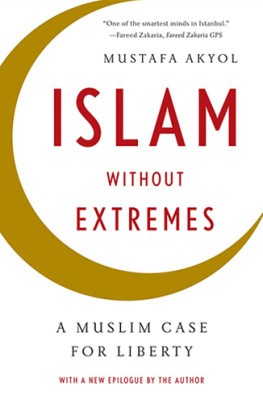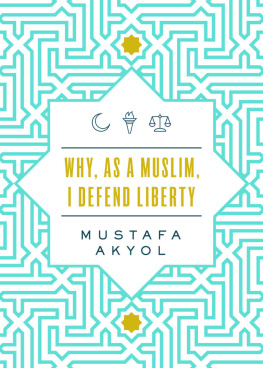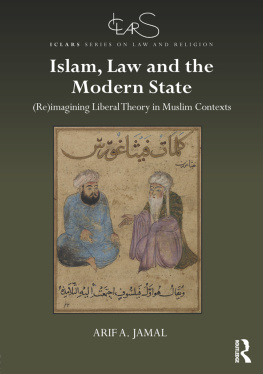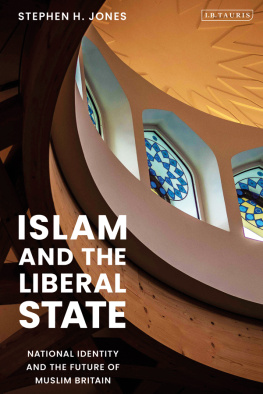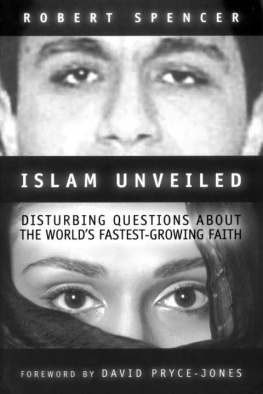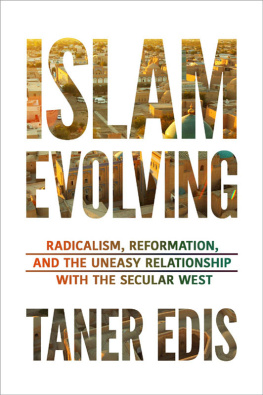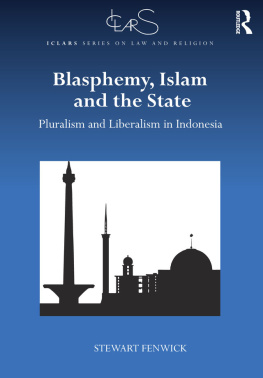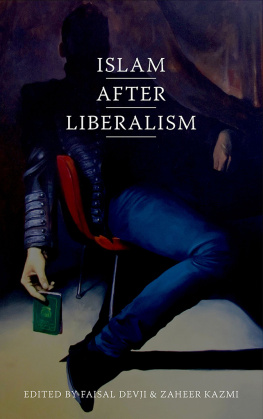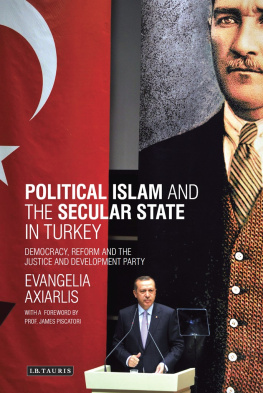
Islam
without
Extremes
A MUSLIM CASE
FOR LIBERTY
Mustafa Akyol
W. W. Norton & Company
New York London
Copyright 2011 by Mustafa Akyol
All rights reserved
Printed in the United States of America
First Edition
Epigraphs for part I and chapter 5 reprinted with permission of Cambridge University Press from The Cambridge History of Islam , vol. 2B. Copyright 1970 by Cambridge University Press. Epigraph for chapter 1 reprinted with permission of the Acton Institute, from Toward a Free and Virtuous Society by Robert A. Sirico. Copyright 1997 by the Acton Institute. Epigraph for chapter 2 reprinted with permission of Oxford University Press, from What Went Wrong? Western Impact and Middle Eastern Response by Bernard Lewis. Copyright 1992 by Bernard Lewis. Epigraphs for chapters 3 and 8 reprinted with permission of the University of Chicago Press, from Islamic Liberalism: A Critique of Development Ideologies by Leonard Binder. Copyright 1988 by the University of Chicago Press. All rights reserved. Epigraph for chapter 7 reprinted with permission of Benjamin R. Barber, from a paper presented at the Istanbul Seminars, organized by Reset Dialogues on Civilization . Copyright 2008 by Benjamin R. Barber. Epigraph for part III reprinted with permission of Michael Novak, from The Universal Hunger for Liberty: Why the Clash of Civilizations Is Not Inevitable by Michael Novak. Copyright 1994 by Michael Novak. Epigraph for chapter 9 reprinted with permission of Vincent Cornell, from his paper entitled Islam: Theological Hostility and the Problem of Difference. Copyright 1993 by Vincent Cornell.
For information about permission to reproduce selections from this book,
write to Permissions, W. W. Norton & Company, Inc.,
500 Fifth Avenue, New York, NY 10110
For information about special discounts for bulk purchases, please contact W. W. Norton Special Sales at specialsales@wwnorton.com or 800-233-4830
Manufacturing by Courier Westford
Book design by Marysarah Quinn
Production manager: Julia Druskin
Ebook conversion by Erin Campbell, TIPS Technical Publishing, Inc .
Library of Congress Cataloging-in-Publication Data
Akyol, Mustafa, 1972
Islam without extremes : a Muslim case for liberty / Mustafa Akyol. 1st ed.
p. cm.
Includes bibliographical references and index.
ISBN 978-0-393-07086-6 (hardcover)
1. Islam and state. 2. SecularismIslamic countries. 3. LibertyRelgious aspectsIslam. 4. LiberalismIslamic countries. I. Title.
BP173.6.A4297 2011
297.272dc22
2011014936
W. W. Norton & Company, Inc.
500 Fifth Avenue, New York, N.Y. 10110
www.wwnorton.com
W. W. Norton & Company Ltd.
Castle House, 75/76 Wells Street, London W1T 3QT
1234567890
To my beloved parents, Tlin and Taha Akyol,
to whom I owe more than I could ever say
Being created free by God, man is naturally obliged to benefit from this divine gift. [Thus] state authority should be realized in the way which will least limit the freedom of the individual.... The right of the sultan in our country is to govern on the basis of the will of the people and the principles of freedom. His title is one charged with kingship [after all], not owner of kingship. Ottoman Muslim intellectual Namk Kemal,in his journal Hrriyet
(Liberty), July 20, 1868
Contents



Glossary
Abbasid . Islamic dynasty that held the seat of the caliphate from 750 to 1258; its capital was Baghdad.
Abode of Islam ( dar al-Islam ) . Lands ruled by Muslims according to the Shariah (Islamic law).
Abode of Treaty ( dar al-ahd or dar al-sulh ) . Lands ruled by non-Muslims who negotiated treaties with a Muslim state.
Abode of Trial ( dar al-ibtila ) . A term used by medieval Muslim scholars to define the world as a testing ground for humans to use their free will.
Abode of War ( dar al-harb ) . Lands ruled by non-Muslims that are considered enemy territory.
Allah . The Arabic word for God, used by Muslims and Arabic-speaking Christians.
al-Maturidi . The tenth-century founder of a school of theology open to reason and free will; an alternative to Asharism.
Almohavids . A rigid Berber Muslim dynasty that conquered much of northern Africa and southern Spain in the twelfth century.
Anatolia . The westernmost point of Asia, also known as Asia Minor. It also has been used to refer to less privileged parts of Turkey vis--vis major cities such as Istanbul.
Anatolian Tigers . Successful Anatolia-based companies that have emerged since the 1980s; similar to such other terms as the Celtic Tiger, Asian Tigers.
Asharism . School of theology, created by al-Ashari, that is skeptical of reason and free will.
ayatollah . Token of God, the highest rank among Shiite clerics.
Banu Qurayza . An ancient Jewish tribe that lived in northern Arabia until its conflict with the Prophet Muhammad.
Basij . A paramilitary volunteer militia in the Islamic Republic of Iran, active in morality policing and suppression of dissidents.
Battle of Badr (624) . The first military encounter between the Muslims of Medina and the pagans of Mecca.
Battle of Siffin (657) . A part of the first Muslim civil war, fought on the banks of the Euphrates between the supporters of Ali and the supporters of Muawiyah.
Battle of the Trench (627) . An unsuccessful siege of Medina by the pagans of Mecca.
Battle of Uhud (625) . The second military encounter between the Muslims of Medina and the pagans of Mecca.
Bedouin . A predominantly desert-dwelling, nomadic, Arab ethnic group.
bey . An honorific Turkish title for men.
bida . Innovation; an unacceptable departure from the alleged tradition of the Prophet Muhammad.
burqa . An all-enveloping garment worn by some Muslim women.
caliph . A successor to the Prophet Muhammad and thus the leader of the Muslim community for Sunnis. The first four successors were the Rightly Guided Caliphs. The institution itself is called the caliphate.
Committee of Union and Progress (CUP or Ittihat ve Terakki Cemiyeti ) . A revolutionary group founded by a branch of the Young Turk movement in 1889; it took total control of the Ottoman Empire after 1913.
Coptic Christians . A major ethnoreligious group in Egypt.
dhimmi . Non-Muslimstypically, Jews and Christianswho received protected status in Islamic lands.
Directorate of Religious Affairs ( Diyanet Isleri Baskanlg ). The official religious body formed by the Republic of Turkey in 1924 to replace the Ottoman religious institutions. Based on the Hanafi school.
Ecumenical Patriarch . The Greek patriarch of Constantinople, first among equals in the Eastern Orthodox communion.
efendi . An honorific title for men in the Ottoman Empire.
fatwa . A legal opinion issued by a Muslim religious scholar.
fez . A red cap worn by Ottoman men before the 1925 Hat Reform in Turkey.
fiqh . Islamic jurisprudence as developed by jurists. Shariah is the ideal, fiqh ( fkh in Turkish) is the actual practice.
Franks ( or sometimes Francs) . Western Europeans in the Islamic Middle East, often associated with crusading armies.
Next page
